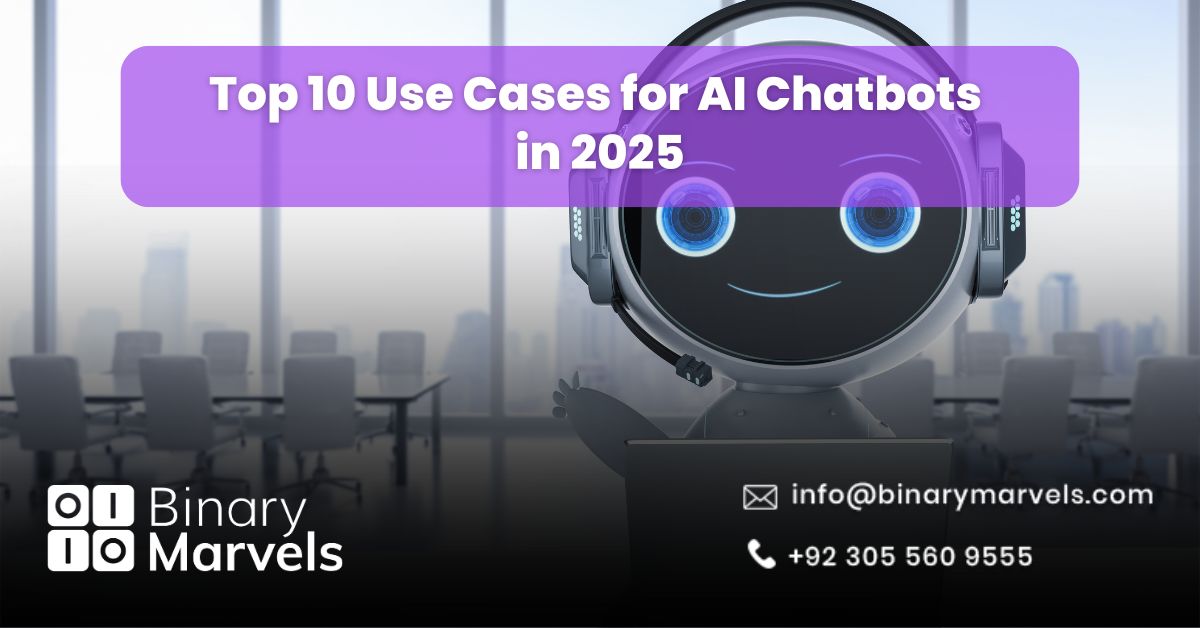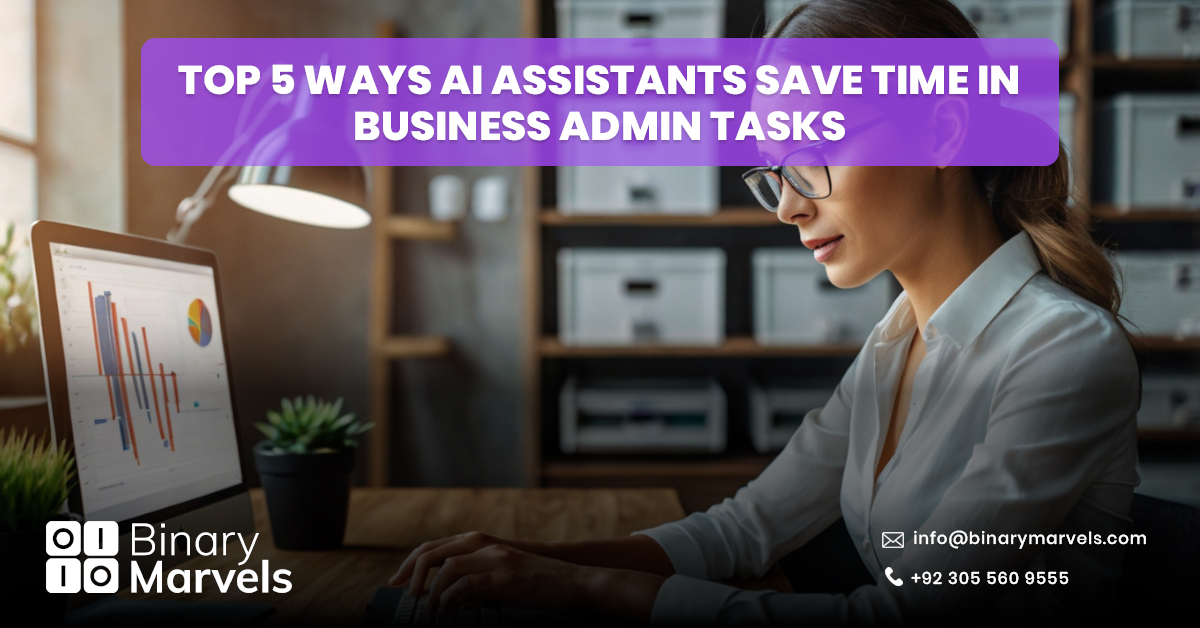
AI chatbots are transforming how businesses operate in 2025. From customer support to marketing automation, the use cases for AI chatbots have rapidly expanded across industries. Companies are leveraging conversational AI to reduce response times, boost sales, personalize experiences, and streamline workflows.
Whether you’re in healthcare, education, finance, or ecommerce, AI chatbots are becoming essential tools for growth and efficiency. In this article, we’ll explore the top 10 use cases for AI chatbots and how they are reshaping the future of business.
Also Read: Top 10 AI Companies in Pakistan
Top 10 Use Cases for AI Chatbots in 2025
1. 24/7 AI-Powered Customer Support
One of the most valuable use cases for AI chatbots in 2025 is delivering 24/7 customer support. Modern customers expect instant help at any hour, and AI-powered chatbots make that possible without requiring a live team around the clock. This consistent availability improves customer experience and builds trust, especially for global businesses.
AI chatbots significantly reduce response times by handling multiple conversations at once. This improves customer satisfaction and helps resolve issues faster, especially for repetitive queries like order tracking, account access, or basic troubleshooting. Companies see measurable increases in CSAT and loyalty when users receive immediate support.
Compared to human agents, AI chatbots offer a more cost-effective solution. While human support remains important for complex cases, chatbots handle routine inquiries at scale with minimal overhead. This helps businesses reduce staffing costs while maintaining high-quality service across channels.
2. Lead Generation and Sales Enablement
AI chatbots play a critical role in automating lead qualification and improving sales efficiency. By engaging visitors in real time, chatbots can ask targeted questions, capture contact details, and qualify leads based on predefined criteria. This helps sales teams focus on high-intent prospects rather than spending time on unqualified leads.
Chatbots can integrate with CRM platforms to instantly route qualified leads to the appropriate sales representatives. This reduces manual input and speeds up the sales process. AI also allows for intelligent follow-ups, ensuring that potential customers remain engaged throughout the buyer journey.
Businesses using chatbots for sales enablement often experience increased conversion rates and shorter sales cycles. The consistent and immediate engagement provided by chatbots ensures no opportunity is missed, especially outside of business hours.
3. AI Chatbots for Marketing Automation
AI chatbots are transforming marketing automation by delivering personalized, real-time interactions that drive engagement and conversions. Instead of relying solely on email campaigns or static landing pages, businesses can now use chatbots to guide users through tailored experiences based on their behavior and preferences.
Chatbots can segment users, recommend products or services, and trigger dynamic campaigns based on past interactions. This allows marketers to create more relevant messaging that feels conversational rather than promotional. AI chatbots can also collect valuable data points during interactions, helping refine targeting and campaign strategies.
With the ability to automate lead nurturing, offer timely promotions, and re-engage inactive users, AI chatbots improve the overall effectiveness of marketing efforts. They act as an always-on marketing assistant that helps businesses deliver the right message to the right person at the right time.
4. Conversational Commerce and Ecommerce Bots
AI chatbots are reshaping the ecommerce experience by offering personalized shopping assistance, guiding users through product discovery, and answering questions in real time. They help customers find exactly what they’re looking for, recommend related products, and simplify the buying process without the need for human support.
Chatbots can handle everything from size guides to order tracking, reducing friction and cart abandonment. By engaging customers at key decision points, they increase the chances of conversion and enhance customer satisfaction. Many ecommerce brands also use chatbots to manage post-purchase interactions, including feedback collection and returns.
In 2025, conversational commerce is becoming a competitive advantage. Businesses that integrate AI chatbots into their online stores see higher engagement, increased average order value, and improved customer loyalty through seamless, interactive shopping journeys.
Also Read: The Ethics of Data Privacy and Security in AI Chatbots
5. Healthcare AI Chatbots
In healthcare, AI chatbots are streamlining patient engagement by providing instant support for appointment scheduling, symptom checking, medication reminders, and basic health queries. They act as a first point of contact, guiding patients through initial steps before involving medical professionals.
These chatbots reduce the burden on administrative and clinical staff by automating repetitive tasks. Patients can receive answers to common questions about services, insurance, or prescriptions without waiting on hold or visiting the clinic. This improves operational efficiency and ensures faster access to care.
Security and privacy are critical in this sector, and many healthcare chatbots in 2025 are designed with compliance in mind, including adherence to regulations like HIPAA. As a result, more healthcare providers are confidently adopting AI chatbots to enhance service delivery while maintaining patient trust.
6. Educational and EdTech Support Bots
AI chatbots are becoming essential tools in education by providing students, teachers, and parents with instant support across various platforms. In virtual classrooms and learning management systems, chatbots assist with course navigation, assignment deadlines, grading policies, and more.
Students benefit from 24/7 access to academic assistance, whether it’s answering subject-related questions, offering study tips, or providing links to learning resources. For institutions, chatbots reduce the workload on administrative staff by handling inquiries about enrollment, schedules, and tuition.
EdTech companies use AI chatbots to personalize learning experiences by tracking student progress and recommending relevant content. In 2025, these bots will help create more engaging and efficient learning environments that adapt to individual needs and boost academic performance.
7. HR and Employee Onboarding Bots
AI chatbots are improving HR operations by automating responses to common employee queries, streamlining onboarding processes, and supporting internal communication. New hires can receive instant guidance on policies, benefits, payroll, and documentation without waiting for HR personnel.
During onboarding, chatbots walk employees through step-by-step processes, such as filling out forms, accessing training materials, and setting up tools or systems. This ensures consistency and reduces manual workload for HR teams while enhancing the employee experience from day one.
In larger organizations, chatbots act as internal helpdesks, answering frequently asked questions related to leave policies, performance reviews, or IT support. By centralizing information and making it accessible on demand, AI chatbots help create a more responsive and efficient workplace.
8. Banking and Financial Services Chatbots
AI chatbots are playing a vital role in banking and finance by offering customers secure, real-time assistance with everyday transactions, account inquiries, and financial planning. They handle tasks like checking balances, transferring funds, and providing updates on loan applications with speed and accuracy.
For institutions, chatbots reduce pressure on call centers and branches by resolving a large volume of routine queries. This improves service availability while cutting operational costs. Chatbots also help detect suspicious activity by notifying users of unusual transactions and enabling quick responses to potential fraud.
Security and compliance are top priorities in this industry. In 2025, financial chatbots are built with advanced encryption, multi-factor authentication, and strict data handling protocols. This makes them a trusted tool for both customers and institutions seeking efficient and secure digital banking experiences.
9. Real Estate and Property Chatbots
AI chatbots are transforming the real estate industry by assisting buyers, renters, and agents through instant, automated conversations. They can answer property-related questions, provide virtual tours, schedule viewings, and collect lead information around the clock.
For property managers and real estate agencies, chatbots help qualify leads by gathering essential details like location, budget, and property type. This ensures that agents spend time only on serious inquiries, speeding up the sales or rental process.
Chatbots also support tenants by handling maintenance requests, rent reminders, and community updates. By automating both customer-facing and internal tasks, real estate businesses improve efficiency, reduce overhead, and enhance client satisfaction in a highly competitive market.
10. Generative AI Agents for Custom Workflows
In 2025, businesses are leveraging generative AI chatbots to design and execute custom workflows across departments. These intelligent agents go beyond scripted responses by generating dynamic outputs, automating decisions, and adapting to complex tasks in real time.
From automating invoice approvals in finance to managing content generation in marketing, generative AI agents are becoming powerful virtual assistants. They integrate with tools like CRMs, project management platforms, and internal databases to carry out personalized actions based on user inputs.
This level of automation reduces manual workload, eliminates repetitive tasks, and ensures greater accuracy. As generative AI continues to evolve, more organizations are building tailored solutions that align with their unique processes and drive measurable productivity gains.
Also Read: Chatbot vs AI Chatbot: Key Differences and Benefits
Final Thoughts: The Future of AI Chatbots in 2025 and Beyond
AI chatbots are no longer just support tools. In 2025, they are strategic assets driving customer engagement, operational efficiency, and business growth across nearly every industry. Their ability to understand context, learn from interactions, and integrate with various systems makes them indispensable for companies that want to stay competitive.
As AI technology continues to evolve, we can expect chatbots to become even more intuitive, emotionally intelligent, and industry-specific. Businesses that adopt AI chatbots now are positioning themselves to lead in a digital-first future where intelligent automation is the norm rather than the exception.
Supercharge Your Business with AI Today!
As a trusted AI Development Company in Pakistan, we deliver cutting-edge AI Development Services designed to streamline your operations and enhance customer engagement.
Don’t wait—connect with us now and take your business to the next level!
FAQs
What is a common use case of chatbots?
A common use case for AI chatbots is providing instant customer support. They handle FAQs, guide users through processes, and resolve simple issues without human involvement.
What problems do chatbots solve?
Chatbots solve problems like long response times, high support costs, and inconsistent customer service. They automate repetitive tasks and provide immediate assistance at scale.
How do AI chatbots personalize interactions?
AI chatbots personalize interactions by analyzing user data, behavior, and preferences. They use this information to deliver tailored recommendations, messages, and support.
Are AI chatbots suitable for small businesses?
Yes, AI chatbots are highly beneficial for small businesses. They offer 24/7 support, automate lead capture, and reduce operational costs without needing a large team.
How secure are AI chatbots in sensitive industries like healthcare or banking?
AI chatbots in sensitive sectors use encryption, authentication, and compliance protocols to ensure data privacy and security. They are built to meet strict industry standards.









